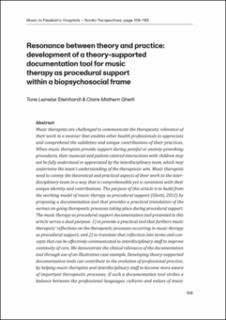Resonance between theory and practice: development of a theory-supported documentation tool for music therapy as procedural support within a biopsychosocial frame
Chapter, Peer reviewed
Published version
Permanent lenke
https://hdl.handle.net/11250/2719999Utgivelsesdato
2020Metadata
Vis full innførselSamlinger
- Artikler og bokkapitler [390]
Originalversjon
I: Music in Paediatric Hospitals – Nordic Perspectives, s. 109-139Sammendrag
Abstract --
Music therapists are challenged to communicate the therapeutic relevance of their work in a manner that enables other health professionals to appreciate and comprehend the subtleties and unique contributions of their practices. When music therapists provide support during painful or anxiety-provoking procedures, their nuanced and patient-centred interactions with children may not be fully understood or appreciated by the interdisciplinary team, which may undermine the team’s understanding of the therapeutic aim. Music therapists need to convey the theoretical and practical aspects of their work to the interdisciplinary team in a way that is comprehensible yet is consistent with their unique identity and contributions. The purpose of this article is to build from the working model of music therapy as procedural support (Ghetti, 2012) by proposing a documentation tool that provides a practical translation of the various on-going therapeutic processes taking place during procedural support. The music therapy as procedural support documentation tool presented in this article serves a dual purpose: 1) to provide a practical tool that furthers music therapists’ reflections on the therapeutic processes occurring in music therapy as procedural support, and 2) to translate that reflection into terms and concepts that can be effectively communicated to interdisciplinary staff to improve continuity of care. We demonstrate the clinical relevance of the documentation tool through use of an illustrative case example. Developing theory-supported documentation tools can contribute to the evolution of professional practice, by helping music therapists and interdisciplinary staff to become more aware of important therapeutic processes. If such a documentation tool strikes a balance between the professional languages, cultures and values of music therapists and the interdisciplinary staff, it may facilitate more meaningful communication amongst professionals, which in turn may contribute to better biopsychosocial care of paediatric patients and their families.
Keywords: procedural support, biopsychosocial, documentation, interdisciplinary collaboration
Utgiver
Norges musikkhøgskoleSerie
NMH-publikasjoner;2020:6Series from Centre for Research in Music and Health (CREMAH);vol. 11
